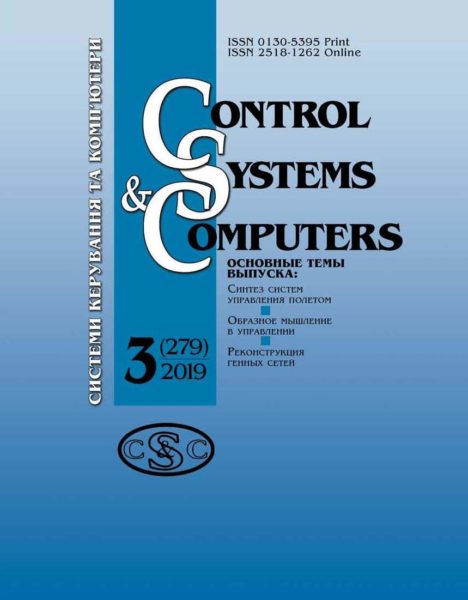Control Systems and Computers, N2, 2023, Article 3
https://doi.org/10.15407/csc.2023.02.027
Control Systems and Computers, 2023, Issue 2 (302), pp. 27-36
UDC 007.330.341
L.I. Bazhan, PhD Econ., Senior Research Associate, International Research and Training Centre for Information Technologies and Systems of the NAS and MES of Ukraine, ORCID: https://orcid.org/0000-0002-8920-8670, Acad. Glushkov ave., 40, Kiev, 03187, Ukraine, bazmil@ukr.net
D.O. Kucha, PhD Econ., Senior Research Associate, International Research and Training Centre for Information Technologies and Systems of the NAS and MES of Ukraine, ORCID: https://orcid.org/0009-0008-3826-7719, Acad. Glushkov ave., 40, Kiev, 03187, Ukraine, dasha2
COMPETITIVENESS OF TRANSPORT AND LOGISTICS SYSTEM IN THE PERIOD OF DIGITAL TRANSFORMATION OF THE ECONOMY
Introduction. The relevance of the competitiveness of transport and logistics system in the period of digital transformation of the economy is associated primarily with the widespread introduction of information technologies, which is caused by the progressive complication of logistics tasks and the intensification of transport processes.
Purpose. To ensure integration of Ukraine into the global transport space and realization of its transit potential, it is necessary to solve such a problem as: the creation of a competitive transport and logistics system based on a technically and technologically integrated transport and logistics infrastructure, as well as systems for coordinating business processes in supply chains.
Methods. The key elements of the further development of the transport and logistics system will be the following tools: digitalization, information technology and innovations. From this point of view, it is necessary to assess the competitiveness of the transport and logistics system according to the methodology of the Institute of Management Development (IMD), the main factors of which are knowledge, technology and readiness for the future. To raise the level of competitiveness of the transport and logistics system during the period of digital transformation of the economy, such digital technologies as big data management, blockchain, cloud computing, the Internet of things, artificial intelligence, virtual and augmented reality are considered.
Result. Due to the need to ensure a high level of compatibility between material flow and logistics services in a complex transport and logistics system, standardization comes to the fore. The article describes the mechanism for organizing a digital platform of the transport and logistics system, where a separate block indicates the regulatory framework, which should ensure the high efficiency of the logistics service. Standardization, as one of the most important infrastructural elements of the economy, which primarily ensures its competitiveness and security, must meet modern requirements for the transition to the digital space.
Conclusions. Thus, the rapid rate of change and complication of social and economic relations require new instruments of legal regulation, for which the norms contained in the standards can be applied, which is becoming an essential part of the global information social and economic development.
Download full text! (On Ukrainian)
Keywords: digital transformation of the economy, transport and logistics system, logistics service, competitiveness, standardization.
- World Economic Forum: Global Competitiveness Report 2019. [online]. Available at: <https://gtmarket.ru/ratings/global-competitiveness-index> [Accessed: 17 Mar. 2023].
- IMD World Digital Competitiveness Ranking. [online]. Available at: <https://www.google.com/url? esrc=s&q=&rct=j&sa=U&url=https://www.imd.org/globalassets/wcc/docs/release-2021/ digital_2021.pdf&ved=2ahUKEwiPxKbho9v9AhULy4sKHYOtC0kQFnoECAYQAg&usg=AOvVaw1V4lFvBMAKypLz1EDAfNVv> [Accessed: 14 Mar. 2023].
- National Transport Strategy of Ukraine 2030. 2021. [online]. Available at: <https://mtu.gov.ua/files/for_ investors/230118/National%20Transport%20Strategy%20of%20Ukraine.pdf> [Accessed: 20 Mar. 2023].
- Connecting to Compete 2018. Trade Logistics in the Global Economy. [online]. Available at: <https://www.researchgate.net/publication/327044979_Connecting_to_Compete_2018_Trade_Logistics_in_the_Global_Economy/link/5c594976458515a4c75939a2/download> [Accessed: 27 Mar. 2023].
- Kopishynska, K.O., 2020. “Current state and prospects of digital transformation of the transport and logistics sector of Ukraine”. The electronic scientifically and practical journal: Intellectualization of Logistics and Supply Chain Manageent. v2, pp. 99-110.
https://doi.org/10.46783/smart-scm/2020-2-8 - Klymash, M., Luntovskyy, A., Beshley, M., Melnyk, I., 2023. “Emerging Networking in the Digital Transformation Age: Approaches, Protocols, Platforms, Best Practices, and Energy Efficiency”. Springer. Lecture Notes in Electrical Engineering, vol. 965, TCSET: IEEE lnternational Conference on Advanced Trends in Radioelectronics, Telecommunications and Computer Engineering, 693 p.
https://doi.org/10.1007/978-3-031-24963-1
Received 06.04.2023



